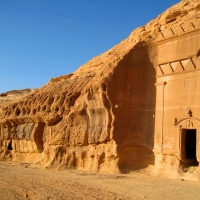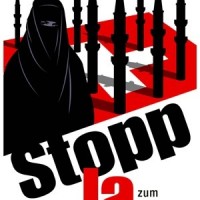Few years ago, I wrote about a number of accomplished Khaleeji women who became the leader of their men-majority society. Inspired by this post, I decided to wrote one about Saudi women. I previously asked in that post: When will Saudi society appoint their first woman leader? The truth is that, they already did. Well, they're not quite there yet, but it's unarguably a milestone for women in Saudi Arabia. So let’s now meet some of the distinguished Saudi women…
Norah Al-Faiz
Women's education had been controlled by men for decades that it was only by the year 2009 that the first ever Saudi woman minister was appointed for this role. On February 2009, Norah Al-Faiz was appointed by the King as the deputy minister for women's education. Yes, this was a history and everyone welcomed the news with delight and excitement. Finally, the Kingdom began to recognize women's role, achievements, and contributions in the development of Saudi society.
Originally from the Kingdom's central region, Nejd, Norah Al-Faiz earned her bachelor degree in sociology from King Saud University in Riyadh in 1987 and her masters degree in education from Utah State University in USA in 1982. She had worked as a teacher, a head principal, a lecturer, an associate professor, and a director of the women's section at the Administration Institute in Riyadh before being appointed as a minister.
Still, there are many challenges faced by Norah. Meetings with other ministers are still conducted through closed-circuit television. Of course, law is a law and you must abide to it. But I found it ineffective to have such segregated meetings. I have worked in a company where we conducted a lot of meetings with the government body JCCI. Although there was only one woman out of five or 6 JCCI members were present, the meetings were still conducted in a mixed-gender environment. And that one woman was not even face-veiled. Now, Norah wears niqab (face veil), so is it necessary to even use a CCTV?!?! Will she be able to voice her opinion and the opinions of many Saudi women in such a meeting? And will her opinion be heard by her male colleagues?
Whatever it is, Saudi women across the Kingdom relies upon her. If she does a great job, people would praise her. But what if she doesn't? Will there be any more Norah in Saudi's Council of Ministers? I am just afraid that the men will blame it all on the women — that women are not capable of doing great job, that women are too weak, etc etc. So let's hope for the best 🙂 .
Thoraya Ahmed Obaid
 For Thoraya Ahmed Obaid, being the "first" in the country is not a new thing. In 1963, she was the first Saudi woman to receive a government scholarship to study in the US — thanks to King Faisal bin Abdul Aziz who was an advocate to women education. In 1974, she earned her PhD from Wayne State University, Michigan; one of the first women to achieve such success. Recently, she has been appointed as the Executive Director of the United Nations Population Fund (UNFPA) and Under-Secretary General of the United Nations. Again, she is the first Saudi to head a United Nations agency.
For Thoraya Ahmed Obaid, being the "first" in the country is not a new thing. In 1963, she was the first Saudi woman to receive a government scholarship to study in the US — thanks to King Faisal bin Abdul Aziz who was an advocate to women education. In 1974, she earned her PhD from Wayne State University, Michigan; one of the first women to achieve such success. Recently, she has been appointed as the Executive Director of the United Nations Population Fund (UNFPA) and Under-Secretary General of the United Nations. Again, she is the first Saudi to head a United Nations agency.
Thoraya's success is without a doubt a result of her hard work, passion, and commitment. She has been working for the UN for 3 decades, starting as a social affairs officer at the ESCWA in Lebanon and went up the corporate ladder. Before being appointed at her present position at UNFPA, she was Director of the Division for Arab States and Europe at the same organization. In 2004, she was ranked among the 50 Most Powerful Arab Women by Forbes magazine.
Empowering women and improving their lives in the developing countries, especially in the Arab region has been the central focus of her work. She established a program and worked with religious and community leaders to "empower communities to bring the change themselves and not bring the change from outside." She is also known as an advocate for women's rights and equality.
Regarding the women's rights in Saudi Arabia, Thoraya said:
I unfortunately see continued barriers against women in some aspects of our society. Traditions and customs, stereotypes, and an interpretation of God's Holy words and the words of his Prophet (PBUH) that isn't in line with the generous spirit of Islam and its special attention to women, are some of the obstacles facing women in the Kingdom.
Women are ‘the sisters of men' as the Prophet (PBUH) said. As such, they are half of the society's wealth; for any society can only be rich by its people, and that includes women. Excluding them from many areas of specialization and work only deprives the society of half of its potential…
Can't agree more.
Lubna Olayan
 Since 1986, Lubna Olayan has been the chief executive officer of the Olayan Financing Company (OFC), a Riyadh-based holding company for the Olayan Group which holds and manages 40 companies throughout the Middle East. The Group was founded by her late father Suliman Saleh Olayan in 1947 and is currently one of the biggest company in Saudi Arabia.
Since 1986, Lubna Olayan has been the chief executive officer of the Olayan Financing Company (OFC), a Riyadh-based holding company for the Olayan Group which holds and manages 40 companies throughout the Middle East. The Group was founded by her late father Suliman Saleh Olayan in 1947 and is currently one of the biggest company in Saudi Arabia.
She received her bachelors degree in agriculture from Cornell University and an MBA from Indiana University. Upon her graduation, she briefly worked in New York before she came back to Saudi Arabia to head the family company. It was her father who encouraged her to join the company in 1983.
Without a doubt, Lubna has raised the status of women in Saudi corporations. She became the first woman to be elected a board of a Saudi public company, Saudi Hollandi Bank. She also co-chaired the 2005 World Economic Forum in Davos. In 2005, she was listed as one of the World’s 100 Most Powerful Women by Forbes Magazine and one of the top 100 most influential people by TIME magazine.
In 2004, she gave a historical speech at the Jeddah Economic Forum — after all, this was the first time ever that a woman was asked to give the opening keynote address at any major conference in the Kingdom, attended by Queen Rania of Jordan and former US President Bill Clinton. Her speech is about how to improve Saudi economy and to tackle the problems and challenges faced by the Kingdom. And most importantly, it is truly about her vision for the development and growth of her own country.
My vision is of a country with a prosperous and diversified economy in which any Saudi citizen, irrespective of gender who is serious about finding employment, can find a job in the field for which he or she is best qualified, leading to a thriving middle class and in which all Saudi citizens, residents or visitors to the country feel safe and can live in an atmosphere where mutual respect and tolerance exist among all, regardless of their social class, religion or gender.
She called for the importance of change because "change can take away the familiar. Change can challenge us and change can force us to re-examine the way we conduct ourselves." She went on to say that "without real change, there can be no progress. So, if we in Saudi Arabia want to progress, we have no choice but to embrace change." You can read her complete speech here.
Muna AbuSulayman
 I saw her for the first time when a friend of mine showed me a program in a Dutch TV (watch it here — half in Dutch, half in English so you can still understand it). Apparently, she was already famous by then. She is one of the hosts of a popular talk show called Kalam Nawaem (which means Sweet Talk) aired on Saudi-owned MBC TV. This program becomes an instant favorite because it raises many taboo issues that had never been discussed openly on TV before. This includes homosexuality, violence against women, rights between men and women, masturbation, sex education, infidelity, divorce, and polygamy. Because it is hosted by four women from different Arab countries, the show also represents many voices of women not only in Saudi Arabia, but in the whole Arab region.
I saw her for the first time when a friend of mine showed me a program in a Dutch TV (watch it here — half in Dutch, half in English so you can still understand it). Apparently, she was already famous by then. She is one of the hosts of a popular talk show called Kalam Nawaem (which means Sweet Talk) aired on Saudi-owned MBC TV. This program becomes an instant favorite because it raises many taboo issues that had never been discussed openly on TV before. This includes homosexuality, violence against women, rights between men and women, masturbation, sex education, infidelity, divorce, and polygamy. Because it is hosted by four women from different Arab countries, the show also represents many voices of women not only in Saudi Arabia, but in the whole Arab region.
Having born and raised in the US, Muna is certainly different than other Saudi women I'd normally encounter. She is very well-educated, active, open-minded, smart, and outspoken. She had experienced different cultures as she had the opportunity to also live in Malaysia where her father headed the Islamic University. In 2005, she became the first Saudi woman to be appointed by the UNDP as a Goodwill Ambassador. She also serves as a lecturer in English literature at King Saud University in Riyadh and an Executive Director of Alwaleed Bin Talal Foundation, a charitable and philanthropic organization chaired by Prince Al-Waleed bin Talal. She was named Young Global Leader at the 2007 World Economic Forum in Davos and Yale World Fellow by Yale University in 2009. Due to her achievements and leadership success, she has received a number of awards internationally and has enjoyed praises from different parts of the Saudi society because of her role in improving the image of Saudi and Muslim women in the West.
Recently, Riz Khan from Al Jazeera English interviewed her providing some insights about her life and views in general. I think it's quite interesting to watch. She is definitely a role model for many Saudi women. And I'm hoping that there'll be many more Muna who can represent modern Saudi women in the years to come.
Nahed Taher
 Her name came to surface when she was appointed as the chief executive officer for the Gulf One Investment Bank, which has an authorized capital of $1 billion. Nahed Taher was the first Saudi woman not only in her country but in the whole Gulf region to hold such high position in a bank.
Her name came to surface when she was appointed as the chief executive officer for the Gulf One Investment Bank, which has an authorized capital of $1 billion. Nahed Taher was the first Saudi woman not only in her country but in the whole Gulf region to hold such high position in a bank.
Nahed studied Economics at King Abdulaziz University in Jeddah. She obtained her masters degree and PhD in the same field from Lancaster University Management School, UK. After completing her PhD in 2001, she turned down a high-powered job with the International Monetary Fund, and returned to Saudi Arabia, where she became the first and only woman (among 4000 male coworkers) to be hired as senior economist by the National Commercial Bank, the largest bank in the country. In 2006, Forbes magazine chose her to be one of the World's 100 Most Powerful Women.
According to Nahed, a total of SR 15 billion worth of deposits in the Saudi banking system are held by women. Yet restrictive regulations are unfortunately still imposed — for example, a woman has no rights to open a bank account without her husband's or father's permission. This will discourage women to go into business, she said. Nahed also shows how the transition into the modern world has been slow for Saudi women. The high rate of female fertility shows that women's primary role continues to be childbearing rather than income-generating. "Resistance to female education stems from the conviction that women should be supported by their husbands, but times have changed. Not all women are well-provided for; work has become a necessity for some in order to guarantee dignity, independence and respectability," she observes. "The role of Saudi women is very important to the economy."
Nahed credits her success to her father and the manner in which she was raised. "Raise your children, educate them, share your life and work with them. Let them know what is going on in the world. This is what my father did with me; he would put me on his lap and allow me to share his world."
Others
There are many other Saudi women that has joined the success of these five women I describe above. We can't seem to miss the contributions they have done to their country, these includes: Samira Ibrahim Islam who has contributed to the girls education in Saudi Arabia; Nabilah Al-Tunisi who is a manager at Aramco's Project Support and Control Department; and not to be missed, HRH Princess Adela bint Abdullah who is one of the daughters of the current King of Saudi Arabia, a vice president of the National Family Safety Program, and an advocate for women's rights; as well as HRH Princess Loulwa Al-Faisal bin Abdulaziz who is the daughter of former King Faisal and who has been involved in promoting women's education and social and family welfare.
Looking at these women, they have one common thing: knowledge. I believe this is the underlying and most basic needs for each person to be successful. Women should not be denied access to education for any reason! This is one of our key assets. If we develop the knowledge of our children's generation now, you'll see and enjoy the outcome in a few more years. Who would have thought that providing a woman scholarship would eventually provide her the chance to head one of the biggest organization and — at the same time — improve the perception of Saudi women in the world? So rather than criticizing about the mixing of men and women in the newly inaugurated Saudi university KAUST, let's support King Abdullah's vision in advancing Saudi Arabia's scientific and technological contributions in the Kingdom and the world.



4 Responses
lol gw dulu sering nonton kalam nawaem tapi baru sekarang tau nama hostnya.. topiknya emang enak buat diikutin. two thumbs up for this topic!
Muna Abusulayman is my role model..
Excellent article, thank you. It was a pleasure reading this.
I hope more and more women will take active role in shaping the society. I read somewhere that even Aisyah ra was the teacher for many shahabah / men companions of the Prophet.
However, we could do without the extremists, in this case, extremist feminists. In many cases, they do not fix the problem, but instead adding more problems.
I hope that many more muslimah, with their special abilities from God, will be able to contribute more to our ummah / society.
Thanks again.
@sufehmi: Yes, I do agree with you re: extremist feminists. Anything that are considered too extreme is not good 🙂 So we always need to be in the middle… It’s the same as balancing our life the life after kiamat.